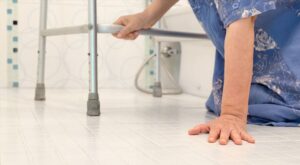
Falls can put your older loved ones at risk of serious injuries. Falls can result in broken bones, head injuries, hip fractures, etc. Even a fall without a serious injury can cause an older adult to become fearful or depressed. If you have an aging parent, helping them to reduce the risk of falling is a great way to help them stay healthy and independent for as long as possible. The good news is that most falls can be prevented.
Please consider the following factors that can lead to a fall:
- Vision – it’s getting more difficult for older adults to see obstacles.
- As we age, we lose coordination, flexibility, and balance.
- Some medications may cause dizziness and interactions with each other that may lead to a fall.
- Chronic conditions like diabetes, stroke, arthritis, etc.
The steps that you can take to prevent your older adults from falling include:
- Ask them if they are concerned about falling. Many adults realize the risk of falling and the results it may lead to. However, most of them believe it won’t happen and they won’t be hurt. If they are concerned about the risk of falling, it’s always a good idea to discuss this with your health care provider who can suggest the programs that could help.
- Ask your older loved ones if they experience any problems with managing their own health. Encourage them to speak openly with their health care provider and discuss their concerns.
- If you notice they are holding onto walls, ask your therapists how to improve your older adults’ balance. They might also suggest a cane or walker and guide how to use these aids.
- If your older adults experience some side effects after taking medicine, discuss their concerns with their doctor. Ask them to get their medications reviewed every time they get a new prescription.
